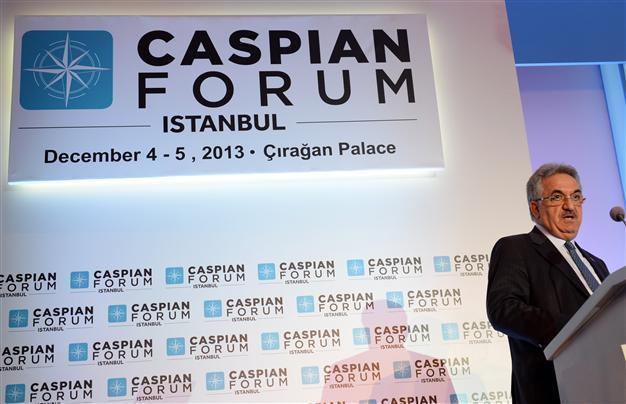Turkey aims to serve as energy corridor: Minister
ISTANBUL

Trade and Custom Minister Hayati Yazıcı speaks at the opening ceremony of the third Caspian Forum in IStanbul on Dec. 4. DAILY NEWS photo, Emrah GÜREL
While energy supply security is an issue on many countries’ agendas, Turkey is working to meet its own demand and to become an “energy corridor” through the European and global markets, Turkish Trade and Custom Minister Hayati Yazıcı has said.
Yazıcı was speaking at the opening ceremony of the third Caspian Forum in Istanbul late Dec. 4.
“The research on the energy sector shows global energy demand will increase by 60 percent by 2030. Europe’s energy demand will rise by 45 percent in the next 20 years as the European countries’ dependency on natural gas will rise from 51 percent to 70 percent by 2020,” Yazıcı said at the forum organized by Istanbul-based think tank Caspian Strategy Institute (HASEN).
The minister pointed out that 73 percent of the world’s crude oil reserves and 72 percent of the world’s natural gas reserves were located in the Caspian Region, Middle East Region and Russian Federation, which all surrounded Turkey.
“This situation makes Turkey a ‘bridge’ between energy-rich countries and Europe that spends $300 billion on energy imports. For this reason, while Turkey develops projects for meeting its own energy demand, it also aims to serve as the most appropriate [energy] route that opens to Europe and global markets,” he said.
Safe common futureThe main goal of the gathering is to connect countries, cities and people via energy networks and transport corridors for a safe common future, Yazıcı noted. “The region under the influence of the Caspian Sea represents 1.9 billion people, that makes one quarter of the world’s population; as the region’s GDP is worth more than $20 trillion that also makes one quarter of the world’s total GDP,” he said. He also added that the countries off the coast of the Caspian Sea had 12 percent of the world’s crude oil reserves and 4 percent of natural gas reserves.
The opening session started with the welcome speech of Haldun Yavaş, the Secretary General of HASEN. The other speakers were Shahmar Movsumov, the Executive Director of State Oil Fund of Azerbaijan (SOFAZ), Dr. Williem Schoeber, the Chairman of EWE Turkey Holding, Prof. Dr. Kerem Alkın from Istanbul Trade University and Zviad Kvatchantiradze, the First Vice-Chairman of the Foreign Relations Committee of Georgia.
HASEN is hosting key figures from the energy and international relations spheres at the Caspian Forum taking place between Dec. 4 and 5 at Istanbul’s Çırağan Palace. It aims to provide the political and business worlds with strategic offers on energy, international relations, security, economy, education, culture and environmental issues with its studies and data on the Caspian Sea region and its surrounds.
The Caspian Forum will be discussing Turkey as an “energy hub” and its aim of becoming a country that reserves the right to fix energy prices amid recent developments in regional energy issues, including the latest situation in the Southern Energy Corridor, the steps taken for the TANAP Project, the recently unveiled Marmaray Project and efforts to revive the Silk Road.
